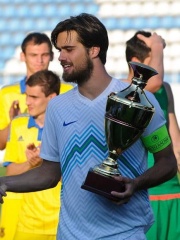Soccer Player
Xeka
1994 - today

 Xeka
Xeka
Miguel Ângelo da Silva Rocha (born 10 November 1994), known as Xeka (Portuguese pronunciation: [ˈʃɛkɐ]), is a Portuguese professional footballer who plays as a midfielder for Primeira Liga club Estoril. Brought up at Braga, he spent most of his career in France, playing for Lille, Dijon and Rennes in Ligue 1 and winning the league with the first of those teams in 2020–21 while making 144 total appearances. Read more on Wikipedia
His biography is available in 14 different languages on Wikipedia. Xeka is the 18,413th most popular soccer player, the 667th most popular biography from Portugal and the 237th most popular Portuguese Soccer Player.
Xeka is a Portuguese footballer known for his versatility as a midfielder and his strong performances in domestic leagues, particularly in the Primeira Liga. He gained prominence playing for clubs like Lille OSC and SC Braga, showcasing his skills in both attacking and defensive roles.
Memorability Metrics
Page views of Xeka by language
Among Soccer Players
Among soccer players, Xeka ranks 18,413 out of 21,273. Before him are Rasmus Würtz, Malick Fofana, Franck Dja Djédjé, Matt O'Riley, Josh Wolff, and Nobuhiro Kato. After him are Syarhey Amelyanchuk, José Luis Rodríguez, Rúben Vinagre, Kelvin Jack, Rubén Peña, and Antonio Raíllo.
Most Popular Soccer Players in Wikipedia
Go to all RankingsRasmus Würtz
1983 - Present
HPI: 36.28
Rank: 18,427
Malick Fofana
2005 - Present
HPI: 36.28
Rank: 18,428
Franck Dja Djédjé
1986 - Present
HPI: 36.28
Rank: 18,429
Matt O'Riley
2000 - Present
HPI: 36.27
Rank: 18,430
Josh Wolff
1977 - Present
HPI: 36.27
Rank: 18,431
Nobuhiro Kato
1984 - Present
HPI: 36.27
Rank: 18,432
Xeka
1994 - Present
HPI: 36.26
Rank: 18,433
Syarhey Amelyanchuk
1980 - Present
HPI: 36.26
Rank: 18,434
José Luis Rodríguez
1998 - Present
HPI: 36.26
Rank: 18,435
Rúben Vinagre
1999 - Present
HPI: 36.26
Rank: 18,436
Kelvin Jack
1976 - Present
HPI: 36.26
Rank: 18,437
Rubén Peña
1991 - Present
HPI: 36.25
Rank: 18,438
Antonio Raíllo
1991 - Present
HPI: 36.25
Rank: 18,439
Contemporaries
Among people born in 1994, Xeka ranks 862. Before him are Robin Zentner, Valentina Giacinti, Ibrahima Cissé, Nora Heroum, Pyry Soiri, and Nyjah Huston. After him are Ryohei Michibuchi, Steliano Filip, Luka Krajnc, Bianca Ryan, Merhawi Kudus, and Victor Sá.
Others Born in 1994
Go to all RankingsRobin Zentner
SOCCER PLAYER
1994 - Present
HPI: 36.36
Rank: 856
Valentina Giacinti
SOCCER PLAYER
1994 - Present
HPI: 36.35
Rank: 857
Ibrahima Cissé
SOCCER PLAYER
1994 - Present
HPI: 36.34
Rank: 858
Nora Heroum
SOCCER PLAYER
1994 - Present
HPI: 36.31
Rank: 859
Pyry Soiri
SOCCER PLAYER
1994 - Present
HPI: 36.30
Rank: 860
Nyjah Huston
ATHLETE
1994 - Present
HPI: 36.28
Rank: 861
Xeka
SOCCER PLAYER
1994 - Present
HPI: 36.26
Rank: 862
Ryohei Michibuchi
SOCCER PLAYER
1994 - Present
HPI: 36.25
Rank: 863
Steliano Filip
SOCCER PLAYER
1994 - Present
HPI: 36.24
Rank: 864
Luka Krajnc
SOCCER PLAYER
1994 - Present
HPI: 36.24
Rank: 865
Bianca Ryan
ACTOR
1994 - Present
HPI: 36.24
Rank: 866
Merhawi Kudus
CYCLIST
1994 - Present
HPI: 36.22
Rank: 867
Victor Sá
SOCCER PLAYER
1994 - Present
HPI: 36.22
Rank: 868
In Portugal
Among people born in Portugal, Xeka ranks 667 out of 633. Before him are Beto (1998), Emanuel Silva (1985), Tiago Dantas (2000), Thierry Correia (1999), Álvaro Parente (1984), and Luís Frade (1998). After him are Rúben Vinagre (1999), Cafú (1993), Nuno Santos (1995), Tiago Tomás (2002), Joana Ramos (1982), and Iúri Leitão (1998).
Others born in Portugal
Go to all RankingsBeto
SOCCER PLAYER
1998 - Present
HPI: 36.83
Rank: 661
Emanuel Silva
ATHLETE
1985 - Present
HPI: 36.74
Rank: 662
Tiago Dantas
SOCCER PLAYER
2000 - Present
HPI: 36.73
Rank: 663
Thierry Correia
SOCCER PLAYER
1999 - Present
HPI: 36.59
Rank: 664
Álvaro Parente
RACING DRIVER
1984 - Present
HPI: 36.36
Rank: 665
Luís Frade
HANDBALL PLAYER
1998 - Present
HPI: 36.31
Rank: 666
Xeka
SOCCER PLAYER
1994 - Present
HPI: 36.26
Rank: 667
Rúben Vinagre
SOCCER PLAYER
1999 - Present
HPI: 36.26
Rank: 668
Cafú
SOCCER PLAYER
1993 - Present
HPI: 36.21
Rank: 669
Nuno Santos
SOCCER PLAYER
1995 - Present
HPI: 35.97
Rank: 670
Tiago Tomás
SOCCER PLAYER
2002 - Present
HPI: 35.93
Rank: 671
Joana Ramos
ATHLETE
1982 - Present
HPI: 35.93
Rank: 672
Iúri Leitão
CYCLIST
1998 - Present
HPI: 35.87
Rank: 673
Among Soccer Players In Portugal
Among soccer players born in Portugal, Xeka ranks 237. Before him are Hernâni Fortes (1991), Tiago Silva (1993), Mário Sérgio (1981), Beto (1998), Tiago Dantas (2000), and Thierry Correia (1999). After him are Rúben Vinagre (1999), Cafú (1993), Nuno Santos (1995), Tiago Tomás (2002), Sérgio Pinto (1980), and Licá (1988).
Hernâni Fortes
1991 - Present
HPI: 37.06
Rank: 231
Tiago Silva
1993 - Present
HPI: 36.90
Rank: 232
Mário Sérgio
1981 - Present
HPI: 36.88
Rank: 233
Beto
1998 - Present
HPI: 36.83
Rank: 234
Tiago Dantas
2000 - Present
HPI: 36.73
Rank: 235
Thierry Correia
1999 - Present
HPI: 36.59
Rank: 236
Xeka
1994 - Present
HPI: 36.26
Rank: 237
Rúben Vinagre
1999 - Present
HPI: 36.26
Rank: 238
Cafú
1993 - Present
HPI: 36.21
Rank: 239
Nuno Santos
1995 - Present
HPI: 35.97
Rank: 240
Tiago Tomás
2002 - Present
HPI: 35.93
Rank: 241
Sérgio Pinto
1980 - Present
HPI: 35.67
Rank: 242
Licá
1988 - Present
HPI: 35.46
Rank: 243








































